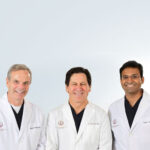The Risks, Preparation, & Recovery of a Blepharoplasty (Eyelid Surgery)
Conveniently located to serve the areas of Maryland, Virginia and Washington, D.C.
Posted on October 12, 2017 under Blepharoplasty
Blepharoplasty is a cosmetic procedure that improves the appearance of upper and lower eyelids. This cosmetic surgery can correct droopy eyelids, puffiness, and bags under the eyes and can also remove excess fat and skin from eyelids. Besides giving the face an aging look, sagging skin around the eyes can also affect your peripheral vision. Blepharoplasty can correct all eyelid problems. Blepharoplasty is also done along with other cosmetic surgery procedures such as a facelift or a brow lift.
Dr. Franklin D. Richards & Dr. A. Dean Jabs offer Blepharoplasty for all eyelid problems. You can avail of this procedure from their clinics located at Bethesda, MD McLean, VA; Northern Virginia; Fairfax, VA; Alexandria, VA, Chevy Chase, MD; Rockville, MD.
The risks
It is imperative to know the risks involved in any medical procedure before undertaking it. Discuss with your plastic surgeon before you decide on your cosmetic surgery. Here are some of the risks of eyelids surgery.
- Infections
- Injuries
- Dry eye
- Scarring
- Loss of vision
- Trouble in closing eyes
- General risks related to any medical procedure such as complications arising from anesthesia.
The preparation
Before your eyelid surgery, your plastic surgeon will give you detailed instructions to prepare you for the procedure. Your doctor will ask you about your medical history, and any prior surgeries or medications that you may be taking. Your doctor will also ask you for information on any eye problem you may have had previously or still have. These can be simple problems like dry eyes or more complicated ones such as glaucoma.
Your plastic surgeon will also take into account any allergies you might suffer from. You have to stop taking any anti-inflammatory drugs before the surgery. If you smoke, you will have to quit it a few weeks before your surgery.
The procedure
The surgical procedure begins with the administration of anesthesia. The surgery involves incisions in the upper lids or lower lids or both to remove excess fat or to correct the problems. Once done, the incisions are closed using surgical tape or absorbable sutures. Some temporary effects of the surgery may include blurred vision, light sensitivity, puffy eyelids, watery eyes, redness, bruising, pain, and blurred vision.
Post-surgery care
It is of utmost importance that you follow all instructions that your plastic surgeon gives you for your recovery. Your doctor will prescribe you eye drops or ointments to use for a few days. Other instructions will be to avoid exposure to the sun, avoid swimming, or any activity that may put a strain on your eyes. Rubbing the eyes, smoking, and anti-inflammatory medicines are not allowed for a few days post-surgery.
Consult your doctor for any medication you might need for pain in your eyes. Ask your doctor before you take any other over-the-counter medicine for other health issues you might be having. Some medicines interfere with healing after the surgery so follow your doctor’s instructions.
If you would like to learn more about plastic surgery procedures performed by Plastic Surgeons Franklin D. Richards, M.D. and A. Dean Jabs, M.D. please visit https://cosmeticplastics.com/ or http://breastaugmentationmd.com/
Our Plastic Surgery Associates team includes Dr. Franklin Richards, Dr. A. Dean Jabs, and Dr. Keshav Magge. Each of our plastic surgeons is board-certified, and together they have over 60 years of combined experience. Drs. Richards, Jabs, and Magge are all highly qualified in procedures for the face, breast, and body, and pride themselves in providing excellent results through our state-of-the-art, Quad A certified operating centers






